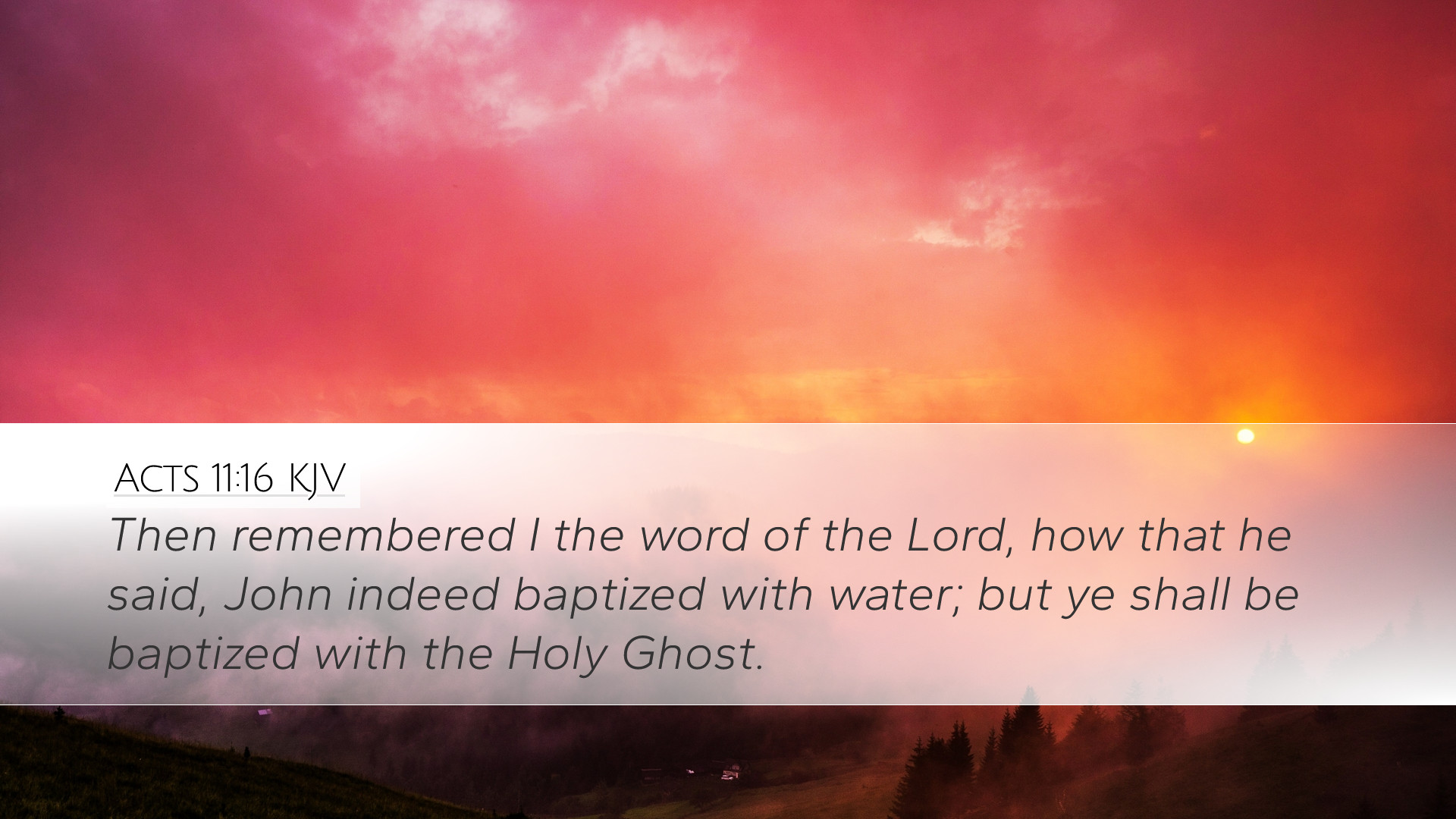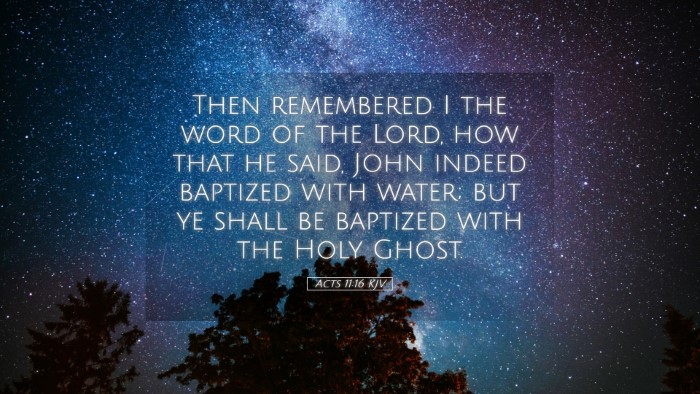Commentary on Acts 11:16
Acts 11:16 (KJV): "Then remembered I the word of the Lord, how that he said, John indeed baptized with water; but ye shall be baptized with the Holy Ghost."
Contextual Overview
This passage occurs within a pivotal moment in the early Church where Peter recounts his vision and the subsequent events that led to the inclusion of the Gentiles into the Christian faith. Peter’s experience in this chapter is crucial for understanding the expanding mission of the church beyond the Jewish people, highlighting God's impartiality and the outpouring of the Holy Spirit on all believers.
Theological Significance
The reference to the baptism of the Holy Spirit serves as a critical theological cornerstone. This event demonstrates that God’s covenant is not limited to Israel but extends to all humanity. The verse encapsulates the promise of the Holy Spirit, a fulfillment of prophetic utterances seen in the Old Testament, which identifies the transformative work of the Spirit in the lives of believers.
Insights from Matthew Henry
Matthew Henry emphasizes that Peter's recollection of God's words signifies the divine intention behind the baptism of the Holy Spirit. He points out that Peter acknowledges the transitional phase between the water baptism of John and the Spirit baptism, underscoring the superiority of the latter.
- Contrasting Baptisms: Henry notes the distinction between John’s baptism and the baptism of the Holy Spirit, illustrating the latter’s capability to effect internal transformation by the Spirit’s empowerment.
- Divine Remembrance: The phrase "remembered I" suggests a moment of divine revelation and reflection that serves to guide Peter's actions and theological understanding.
Insights from Albert Barnes
Albert Barnes offers a detailed analysis of the significance of being "baptized with the Holy Ghost." He clarifies that this baptism is a deeper spiritual immersion that enables Christians to live out their faith powerfully and authentically.
- Spiritual Transformation: Barnes argues that this baptism blends creational and redemptive themes, establishing a new identity for believers as participants in God's grace.
- Inclusivity of God's Grace: He emphasizes that Peter's realization points to the universal availability of the Holy Spirit, a divine initiative for all nations.
Insights from Adam Clarke
Adam Clarke provides a pastoral and exegetical insight into this text, highlighting its implications for early Christian practice and belief. He underscores the miraculous and transformative aspect of the Holy Spirit's baptism.
- Preparation for Ministry: Clarke discusses how this baptism prepares believers for service, suggesting that spiritual empowerment is essential for effective ministry.
- Historical Context: He reflects on the historical context of the early church, marking this event as a watershed moment that dispelled ethnocentrism and welcomed Gentile believers into the fold.
Practical Applications for Pastors and Theologians
The implications of Acts 11:16 extend beyond its immediate historical context and offer significant lessons for contemporary Christian ministry.
- Challenge of Ethnocentrism: Pastors are called to challenge exclusive mindsets within their congregations, embracing a theology that reflects God’s concern for all humanity.
- Importance of the Holy Spirit: Understanding the baptism in the Holy Spirit is crucial for effective ministry and personal transformation; leaders must teach on the empowerment of the Spirit in believers’ lives.
- Community and Inclusion: Acts 11:16 reminds us of the importance of building inclusive church communities where all are welcomed and can experience the transformative work of the Spirit.
Conclusion
Acts 11:16 serves as a powerful reminder of the inclusivity of God's grace and the vital role of the Holy Spirit in the life of the believer. The reflections from notable commentaries prompt a deeper understanding of the historical, theological, and practical implications of this baptism, encouraging an expansive view of ministry that continues to reverberate in today’s Church.


